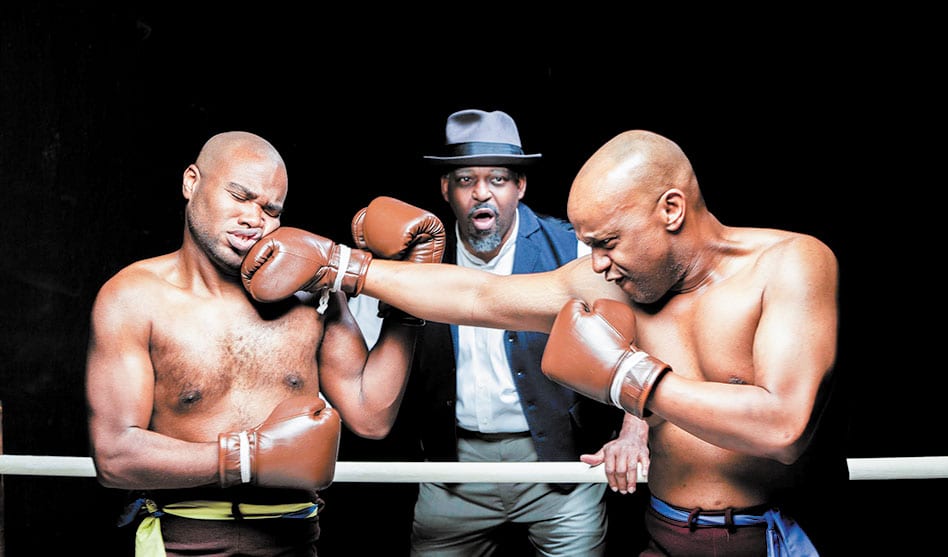Jay (Jamal Gibran Sterling, right) defeats a black challenger (Lee George) before taking on the white world champ in ‘The Royale.’
(Photo courtesy Matt Mrozek)
The Royale’ masterfully explores the conscience of a boxer on the brink of success
ARNOLD WAYNE JONES | Executive Editor
jones@dallasvoice.com
Near the turn of the last century, heavyweight boxer Jack Johnson defeated the reigning champion in a TKO by the 15th round. The fight might have passed into the record books as yet another sports statistic if it hadn’t been that Johnson was a black man and the champ, Jim Jeffries, was white. The Civil War had ended less than 50 years earlier; the idea that a person of color was even equal to a white person was still unfathomable in some circles, especially the Jim Crow South; so to have undisputed proof of his superiority? Well, that turned out to be too much for some folks to handle.
The Royale, Marco Ramirez’s astonishing play getting a title shot at the Trinity River Arts Center thanks to Kitchen Dog Theater, is not specifically a biography of Johnson, but, like Howard Sackler’s 1968 play The Great White Hope, is inspired by him. Whereas Sackler fictionalized Johnson’s life as a meditation on the impact of an interracial marriage, Ramirez’s play is more contemporary, and also feels more relevant. It’s less about the bigotry and insults endured by the son of former slaves in segregated America, and more about the moral dilemma of whether one man, confronted with the unexpectedly power to change the world, should change it, if doing so comes at an unfathomable human cost.
Jay (Jamal Gibran Sterling) is the undisputed king of the ring, although relegated to the interior pages of the sports section because as a black man, he fights only for the Negro title, not the world title. He’s got money and skill and a pretty cushy life, despite being paid far less than his white counterparts, but he wants the respect that comes with being known as the best. After defeating an amateur named Fish (impressive newcomer Lee George), Jay sets his sights on goading the white champ out of retirement for title fight, so he can prove not only to himself but to the world that he truly is the Greatest of All Time.
The champ accepts, and only then does Jay realize that his manager Max (Adrian Churchill) and his corner man Wynton (Marcus M. Mauldin) have spent their careers protecting Jay from the realities of his ambitions. He’s lived in a bubble of success, never fully grasping the powder keg of racial unrest he sits on. If he actually wins the fight, as expected, that could just be a match that lights the fire for equality… but also triggers serious consequences for Jay’s family, blacks nationwide and possibly people he hasn’t even considered.
Many sports plays can be excruciating, since actors can mostly only talk about the sport, and sometimes look less like athletes than fans. But The Royale captures not only the energy of the Sweet Science, but also its psychological inner workings. Christopher Carlos has directed the play smartly, with effective light cues and inventive staging. In a stage version of a split screen, the fighters here face not each other, but the audience, whispering their inner dialogues while taking and giving jabs and uppercuts. Sterling and George are physically imposing in different ways (Sterling beefy and smiling, with Mohammed Ali’s gift for smiling taunts; George lean but muscular, projecting a sense of fear mixing with wonder). You believe they could bout.
Carlos also pulls out great performances from what end up being fleshed-out characters. Max could be a stand-in for all antagonistic white guys — condescending, exploitive, two-dimensional. But Ramirez imbues him with honor, and Churchill brings multiple shadings to a white man of privilege devoted to serving the black man society considers his inferior. Mauldin gets some of the most surprising moments — one, where he launches into a gospel song with a rich baritone; another where he explains the shocking history of what “the royale” was and how it figures into the play’s construct. Jaquai Wade Pearson, the sole woman in the play, doesn’t speak a line of dialogue until two-thirds into the show’s 80 minute run time, but when she does, it’s to shake you.
It’s only as the show begins to wind down for the inevitable climax — the title fight — that its true intent unravels, and you comprehend the full impact of what Jay’s victory will mean: Not the triumph over prejudice, but trigger of violence. The effect takes your breath away and leaves a tear in your eye. The Royale isn’t merely good; it’s a knockout.

